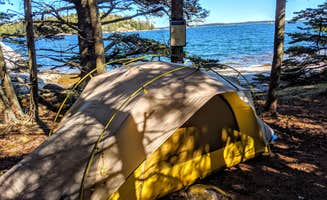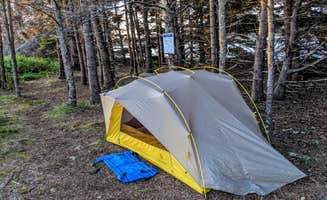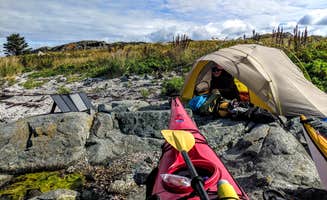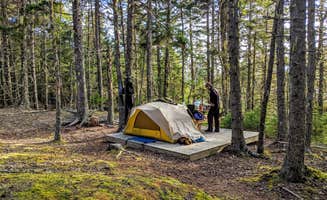Dispersed camping near Harborside, Maine centers on the islands of the Penobscot Bay region. The Deer Isle Archipelago offers boat-in camping experiences exclusively accessible by watercraft. Most sites require membership in the Maine Island Trail Association (MITA), which maintains and preserves these primitive island camping locations. The archipelago experiences typical New England coastal weather patterns with fog common in early mornings, even during summer months.
What to do
Beach exploration at low tide: Buckle Island features a sandy shore exposed for significant portions of the day, making it ideal for landing kayaks and exploring the shoreline. "This is a perfect island for those new to sea kayak camping as the sandy shore, which is exposed for a good portion of the day, is easy to land on and a short walk to a trail into the woods," notes reviewer Shari G.
Visit Acadia National Park extension: Wheat Island serves as an excellent base for exploring nearby Isle au Haut, a remote section of Acadia National Park. According to campers, "Perfect island for exploring the close-by Isle au Haut, a remote section of Acadia National Park, but very hard to get reservations at Duck Harbor Campground."
Shell collecting: The beaches at Doliver Island offer unique shell collecting opportunities not found at other islands in the archipelago. "Gorgeous shell covered beach and a beautiful view of Isle au Haut, just next door," reports one visitor who used the island as a stopping point during a multi-day kayak journey.
What campers like
Sunset and night sky viewing: The southwestern camping area on Wheat Island provides exceptional sunset viewing opportunities across the Gulf of Maine. Campers report, "We stayed at the larger site and had a gorgeous view of the sun setting and full moon rising."
Stargazing opportunities: Marshall Island offers some of the best stargazing in the region, particularly from Sand Cove. One camper described it as "perfect for a beach fire and stargazing on a clear night – some of the best stargazing spots we've ever seen!"
Small footprint camping: Doliver Island appeals to minimalist campers seeking solitude in small spaces. "This island is small with barely a tent space, but a good stop for us on our 9 day journey and a perfect launching spot for crossing Jericho Bay (4.5 miles) to Marshall Island the next day," writes one kayaker who used it as a waypoint.
What you should know
Tide-dependent access: Several islands require careful planning around tidal schedules. Wheat Island campers warn, "This can be a tricky island to land on at high tide, so plan accordingly." Similar challenges exist at Doliver Island.
Insect protection required: Contrary to expectations, mosquitoes remain prevalent into early fall. "We thought we were passed mosquito season in early September, but alas, they were pretty bad at sunset," notes one Wheat Island visitor. Doliver Island reportedly has mosquitoes "pretty bad all day long" even in September.
Supply requirements: No fresh water exists on any islands. As Buckle Island visitors advise, "Come prepared with fresh water (there is no fresh water for filtering) and wag bags (no toilets)." This applies to all islands in the archipelago.
Tips for camping with families
Best for older children: The remote nature and boat-only access makes these sites better suited for families with older, more experienced children. Marshall Island provides more amenities with "a tent platform and a picnic table at each site" near Sand Cove.
Easiest family access: Buckle Island offers the gentlest landing conditions for families. Reviewers note it has "a sandy shore, which is exposed for a good portion of the day, is easy to land on and a short walk to a trail into the woods."
Conservation education opportunity: Participation in beach cleanup efforts provides educational value while camping. Marshall Island visitors mention, "if you do a beach clean-up during your stay and send in a picture, you will receive a Maine Coast Heritage Trust hat!"
Tips from RVers
No RV access: All dispersed camping options near Harborside require boat access, making traditional RV camping impossible in these locations. Consider base camping at established campgrounds on the mainland and using day trips to explore the islands.
Alternative considerations: For RV travelers wanting to experience the region, consider staying at campgrounds in nearby Blue Hill or Deer Isle, then arranging guided kayak tours to visit the islands without overnight camping.
Equipment rental: Several outfitters in the Deer Isle and Blue Hill Peninsula areas offer kayak rentals and guided excursions to these islands, allowing RV travelers to experience the archipelago while maintaining a mainland base camp.





